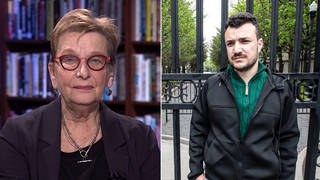
The New York Police Department recently asked a Federal District judge in to lift restrictions that curtail police monitoring of political activity. The request comes a month after the city of Denver publicly released its spy files on hundreds of activists who had been illegally monitored.
In New York the restrictions known as the Handschu agreement limited the ability of the police to investigate political activities by individuals or groups unless investigators have specific information that a crime will be committed or is being planned.
We begin with a column by Newsday reporter Leonard Levitt that was published on Monday:
“Police Commissioner Ray Kelly could not cite one instance, real or hypothetical, in which the Handschu guidelines hindered police in fighting terrorism, the only thing to be said with certainty is that his attempt to abolish them is the Police Department’s first power grab since the World Trade Center attack.
It is a historical decision, and one consistent with the actions of law enforcement agencies across the nation in abrogating the civil rights of citizens, from secret tribunals to people held without criminal charges to lack of public access to court proceedings.
Handschu’s little-known guidelines stem from a 1971 suit filed by 16 plaintiffs, including one Barbara Handschu, who contended that the department violated their civil rights by unlawful surveillance. The guidelines include such safeguards for citizens as establishing suspicion of criminal activity before the department can begin investigating a person’s or group’s political activity.
The consent decree that followed 14 years later in 1985 appeared to recognize a history of law enforcement abuses. Those abuses included the NYPD’s notorious Red Squad during the 1950s and its Bureau of Strategic Services [BOSS] of the 1960s, as well as the FBI’s Cointel-Pro, whose “black bag jobs” aimed at student and black radicals in the 1970s were directed by J. Wallace LaPrade in New York.
The two-year conspiracy trial of Black Panthers in 1971 has faded with time. The Black Panther Party was infiltrated by police under the direction of Frank Hogan, who was the Manhattan prosecutor. The jury acquitted all of them within three hours.”
Guests:
- Norman Siegel, former executive director of the NYCLU.
- Omowale Clay, former member of New York Eight which were monitored for years by the New York City police.
- Mark Silverstein, legal director of the ACLU of Colorado.
Related links:











Media Options